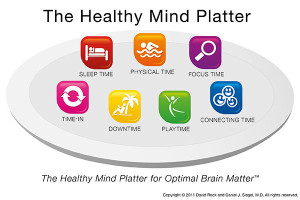 Last week’s blog post Why your brain needs exercise triggered a range of reactions.
Last week’s blog post Why your brain needs exercise triggered a range of reactions.
Some loved it, a few questioned it, and others hated it to such a degree that they unsubscribed from any future posts and newsletters.
No one though yet has asked these two questions:
- What about the role of physical exercise for the brain?
- Are there other activities the brain needs to perform well?
Your brain performs better when you exercise your body as well as your mind. And, for optimal brain health, there are a total of seven activities that you need to do that have different and positive effects on your mind, including physical exercise and mindfulness. More about that later.
For now, though, let’s talk about the differences between exercising your mind and your body.
Being mindful—that is being aware of your present thoughts, emotions and any actions─is one of the best ways to exercise your mind, according to the neuroscientists.
In the paper The neuroscience of mindfulness published in the first issue of the NeuroLeadership Journal in 2008, Dr. Yi-Yuan Tang and Dr. Michael Posner explained that mindfulness is an experience, not just a concept.
When you’re mindful, you focus on the present moment, pulling yourself out of the past and avoiding speculation about the future. This action activates the brain’s three specialized attention networks: alerting, orienting and executive control.
One of the jobs of the executive control network is to manage self-control and self-regulation. When you’re practicing mindfulness, you’re controlling your thoughts so the executive control network can achieve a tranquil state. This serves as an oasis for a mind that can often wander into unknown and sometimes very dark places.
As last week’s blog described, by training yourself─and your mind─to be more mindful, you’re able to improve your ability to pay attention and your cognitive control. Other benefits include reduced stress and potentially better well-being.
(For more on the science, check out the more recent article The neuroscience of mindfulness meditation by Dr. Yi-Yuan Tang, Dr. Michael Posner and this time also Dr. Britta Holzel, published last year in Nature Reviews Neuroscience.)
You also can maintain and improve your brain health through physical exercise. Multiple research studies have shown the benefits on cognitive functioning of many forms of movement, including moderate aerobic exercise.
Physical exercise provides your brain with more energy to think and react. Physical exercise also has been shown to enhance learning and memory, focus even with distractions, reduce stress, decrease anxiety, alleviate depression and stave off mental declines related to aging. Also, those who have suffered from brain injury or disease can enjoy cognitive benefits from physical exercise.
Because physical activity has such positive benefits on brain health, it was irresponsible and insensitive of me in last week’s post to say being mindful by observing in the moment was easier and more fun than playing on monkey bars—especially considering we’re now in the Chinese Year of the Monkey.
Besides practicing mindful and exercising your body to keep your brain healthy, you also need to do five other activities. A healthy brain also benefits from sleep, play, downtime, connections with others and a focus on pursuits that interest you, hopefully including work.
All seven of these activities provide neuro-cognitive benefits. This includes ensuring your well-being (especially mental), increasing your creativity and improving your ability to think and react.
In fact, these seven activities form The Healthy Mind Platter, a model developed by Dr. Dan Siegel and Dr. David Rock. For more about it, check out this NeuroLeadership Journal article by the same name.
As Dan and David envisioned the model, you don’t need to do all seven activities every day (other than sleep), but you do need to do them regularly and they tell you why.
For now, suffice it to say, you need to treat your brain with the care, respect and admiration it deserves. It’s working all the time, even while you sleep.
If you subscribe to the Ralph Waldo Emerson quote that “life is a journey, not a destination,” you probably want your brain to be healthy and working well every step of the way.
Since Emerson’s death in 1882, the journeys we take are more involved and complex with many diversions. Just think about our work days, which often feel like endurance contests.
So be good to your brain!
Are you willing to give it the ideal conditions it needs not just to survive, but also thrive for you?

0 Comments